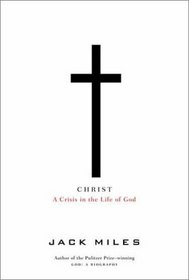Search -
Christ: A Crisis in the Life of God
Christ A Crisis in the Life of God
Author:
Five years after his everywhere–acclaimed, brilliantly successful, Pulitzer Prize–winning book about God as portrayed in the Old Testament—God: A Biography—Jack Miles gives us his striking consideration of Christ. He presents Christ as a hero of literature based only in part on the historical Jesus, asking us to ta... more »
Author:
Five years after his everywhere–acclaimed, brilliantly successful, Pulitzer Prize–winning book about God as portrayed in the Old Testament—God: A Biography—Jack Miles gives us his striking consideration of Christ. He presents Christ as a hero of literature based only in part on the historical Jesus, asking us to ta... more »
ISBN-13: 9780375400148
ISBN-10: 0375400141
Publication Date: 10/30/2001
Pages: 368
Rating: 2
ISBN-10: 0375400141
Publication Date: 10/30/2001
Pages: 368
Rating: 2
2 stars, based on 2 ratings
Publisher: Knopf
Book Type: Hardcover
Other Versions: Paperback, Audio CD
Members Wishing: 0
Reviews: Amazon | Write a Review
Book Type: Hardcover
Other Versions: Paperback, Audio CD
Members Wishing: 0
Reviews: Amazon | Write a Review
Genres:
- Religion & Spirituality >> General
- Religion & Spirituality >> Authors, A-Z >> ( M ) >> Miles, Jack
- Nonfiction >> Philosophy >> General
- Nonfiction >> Philosophy >> Religious
- Christian Books & Bibles >> Bibles >> General
- Christian Books & Bibles >> Theology >> Christology




